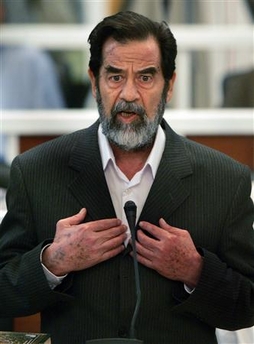At the Lannan Archives, there’s an audio interview with David Foster Wallace interviewed by Dalkey’s John O’Brien. What’s crazy is that he interviews Richard Powers in the same sitting. I wonder how crazy things would have been if they got Vollmann to show up.
Month / October 2005
Four of the Apocalypse

Inspiration for Photo:: Four of the Apocalypse (1962), directed by Lucio Fulci.
Plot Outline (from IMDB): Four petty criminals, three men and a women, wander through the trackless terrain of the Wild West Utah and are hounded by a sadistic bandit.
Hmm…could the “sadistic bandit” be Ronnie Earle?
Saddam Confuses Courtroom with Comedy Club; Performs “Take My Harem, Please!” Act in Front of Judge
DeLay to Mug Shot Camera: “No Nick Nolte Here!”
Hypertext Fiction: Dead or Alive?
I alluded to Robert Coover’s Litquake[1] appearance at Elbo Room in the previous post. But what I failed to mention was Andrew Sean Greer‘s introduction for Coover. Greer, who despite clutching what appeared to be a ferocious palimpsest in his fist, managed to find the will to extemporize about how he met Coover, which was in a classroom at Brown University. The class that Coover taught was “Hypertext in Fiction,” and Greer noted this was a bit before the web browsing days. Coover used hypertext as a way of interconnecting the students’ various stories. Greer confessed that, at first, he thought that such an exercise would be easy, tantamount to devising a “Choose Your Own Adventure” book. But as it turned out, most of the students skipped out on the class, leaving Coover with a small cadre of students (including Greer).
The funny part of Greer’s story was that, as students were composing their work on hypertext, they noticed that some of their minor details had been changed around. Furious, the students approached Coover, pointing out that, as authors, they rightfully controlled the details to these works. Coover responded that he wasn’t the one changing the details, but thought that the mysterious person doing this was on the right track.
Greer’s hypertext anecdote had me wondering, in these days of Web 2.0, Wikipedia and podcasting, whether hypertext is even a suitable medium for fiction anymore. Is hypertextualized fiction something to be frowned upon or ignored, much like the theatrical Happenings of the 1960s? Or is it simply misunderstood? Perhaps we’re limiting our options in thinking, as we have thought since the advent of the byline, that the author exclusively controls the narrative. Since the reader is bound to form certain impressions from a story’s subtext, often wildly disparate from other readers, perhaps the author doesn’t really control the destiny. Because while he is organizing the information, he cannot possibly control how it is read. (And one might argue that David Foster Wallace’s infamous essay from earlier in the year, “Host”[2] which featured several internecine branches of footnotes, might be representative of this potential new model.)
If this is the case, then perhaps the next step after postmodernism is something along the lines of hypertext, something that might be dictated either by footnotes, by hypertext, or through some other device, as yet beyond our powers. Whatever method used, I’m suggesting here that the order in which the information is presented and perused is entirely up to the reader, but the author can control the taxonomy and the structure through which it is accessed. Not unlike a category that might clarify a blog posting and allows it to be strung together through a search engine (such as Technorati) for a common frame of reference.
For more on hypertext[3], they’ve got a lively discussion over at I Love Books, complete with hypertext fiction linkage.
[1] — Additional Litquake coverage can be found at Frances Dinkelspiel’s place.
[2] — Sadly, the PDF version is only readable to Atlantic subscribers. But the essay is contained in Wallace’s forthcoming essay collection, Consider the Lobster.
[3] There are several hypertext stories for sale at Eastgate. Thankfully, Norton has an excerpt of J. Yellowlees Douglas’ “I Have Said Nothing.”
